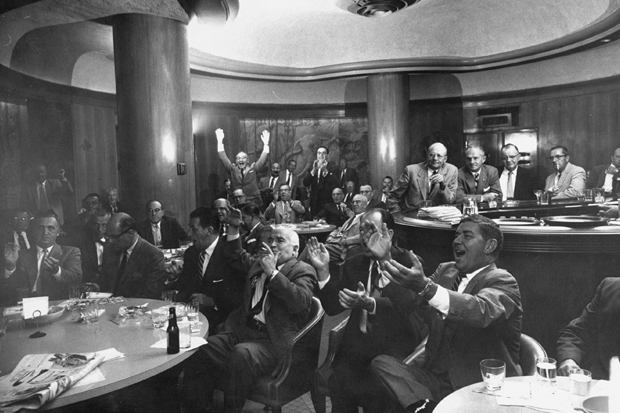‘Leonard Michaels (1933–2003) was one of the most admired and influential American writers of the last half century,’ states the blurb on this reissue of the author’s first and penultimate novel, originally published in the US in 1978. Admired and influential Michaels may have been, but that was largely in his homeland and then as an essayist and author of short stories, rather than as a novelist. The Men’s Club was not published in the UK until 1981 (by Jonathan Cape) and is only now, 35 years later, being made available in paperback by Daunt Books in the category of ‘lost classics’.
If the phrase ‘crisis of masculinity’ did not exist in the late 1970s, Leonard Michaels could be said to have both anticipated and captured it in this book. A group of seven men — friends and strangers — gather in a suburban house in California:
Women wanted to talk about anger, identity, politics, etc. I saw posters in Berkeley urging them to join groups. I saw their leaders on TV. Strong, articulate faces. So when Cavanaugh phoned and invited me to join a men’s club, I laughed. Slowly, not laughing, he repeated himself.
Over the course of one evening, the men banter, drink beer, trade stories of the women they’ve loved and the women they haven’t, bawl, brawl and generally feel very sorry for themselves. As well they might, for The Men’s Club is a horribly acute and very funny depiction of male-pattern emotional idiocy, then or now.
The novel is written in a voice which perfectly fits the buttoned-up and often baffled men who do most of the talking in it: bullish yet uncertain of themselves or one another. The anecdotes they tell of extra-marital affairs, real or imagined, are often conveyed with a bewilderment that not only do their wives not understand them but nor, it transpires, do the other members of the group they are telling the anecdotes to. The members of this men’s club talk at cross-purposes even to themselves:.
Terry lifted a piece of pie to his lips and said, ‘Personally, I prefer courtship.’ The pie slipped into his mouth. He chewed. I looked at his stunted thumbs. Brutal digits. He preferred courtship. Things figure in the human world to the degree they don’t.
As the evening proceeds and declines, with one excruciating yarn after another, Michaels’s facility for the short story comes to the fore — he is a writer adept at conveying character, plot and ideas in relatively few words, brilliantly ventriloquising characters who have little or no facility for doing likewise. The cumulative effect is remorseless and hilarious, building to a pay-off which seems richly deserved yet is barely comprehended by the membership. These guys are a pack of dumb mutts who (literally) howl like wolves, before breaking into a goodnight chorus of ‘For He’s a Jolly Good Fellow’:
When we reached the last line, fourth or fifth time around, ‘Which nobody can deny’, it seemed awesomely true…
At the time that it first appeared, The Men’s Club was a satire of Los Angeles therapy-speak and 1970s encounter groups as much as of gender politics —‘I don’t want to do some oppressive fascist number on you. I mean if you would like to talk now, I could dig it.’ Now it reads as an exploration and indictment of a culture of masculinity that, 40 years later, still struggles to articulate anything worth saying. Michaels maintained that he intended ‘only to describe what is true among some men’; in this terrific little book, he gloriously and somewhat depressingly succeeded. Buy it for the man in your life and then retire to a safe distance.
The post Jolly good fellows appeared first on The Spectator.
Got something to add? Join the discussion and comment below.
Get 10 issues for just $10
Subscribe to The Spectator Australia today for the next 10 magazine issues, plus full online access, for just $10.
You might disagree with half of it, but you’ll enjoy reading all of it. Try your first month for free, then just $2 a week for the remainder of your first year.














Comments
Don't miss out
Join the conversation with other Spectator Australia readers. Subscribe to leave a comment.
SUBSCRIBEAlready a subscriber? Log in